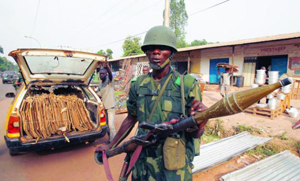Bangui, Feb 13: An exodus of Muslim traders fleeing attacks by Christian militia in Central African Republic has pushed food markets there to the brink of collapse, threatening the nation with even deeper crisis.

The United Nations estimates that 1.3 million people, more than a quarter of the population, are already in need of urgent food aid after months of communal violence that French and African peacekeepers have been unable to stop.
The poor, landlocked country descended into chaos after the mainly Muslim Seleka rebels seized power in March. Looting, rape and murder followed, bringing international pressure that saw Seleka leader Michel Djotodia resign last month. That in turn has been followed by Christian militia attacks on Muslims.
Tens of thousands of terrified Muslims have fled the capital Bangui in recent months, many of them involved in trade with neighbouring countries that once kept the city of 800,000 supplied with staples like sugar, flour, fuel and soap.
In the market of Petevo, close to the banks of the Oubangui river in the south of the city, dozens of dusty stalls stand empty and meat is scarce since the Muslim traders who control the trade in cattle from Chad deserted the city. Only small amounts of pork, from pigs raised locally, are available.
“We are very worried because if these shortages last longer there will nothing left in the market and a lot more people will die of hunger,” said Nadege Kodo, a woman dressed in colourful traditional robes who was searching for supplies.
With nine out of 10 people eating just once a day, according to the United Nations, the country is in dire need.
Trucking routes from Cameroon have shut as machete- and gun-wielding Christian militiamen prowl the countryside, slaughtering Muslims. As Muslims do most of the driving jobs, hundreds of trucks are stranded at the border.
According to a survey by Oxfam and Action Contre la Faim, supplies of staples to Bangui come from some 40 wholesalers who import provisions. Fewer than 10 of these wholesalers remain and they threaten to leave soon if security does not improve.
“There's already a very serious food crisis in Central African Republic,” said Steve Cockburn, Oxfam's regional campaigns manager. “The problem is that the situation is going to get much, much worse.
“Unless communities are better protected, more populations, more traders, more herders will leave the country and there'll be a breakdown in supply in Bangui and beyond.”
On the dusty streets of the capital, a spate of daylight attacks on Muslims over the past week, including one by uniformed members of the armed forces, has raised alarm. On Sunday, a member of the transitional parliament was shot dead a day after calling for Christian militias to be disarmed.
Medecins Sans Frontiers (MSF) said it treated 100 patients for bullet and machete wounds last week at a sprawling camp beside Bangui airport, home to 100,000 homeless people.
“People are coming in without noses, ears, nipples,” said Lindis Hurum, MSF's departing project coordinator at the camp. “One guy came in holding his head to keep it from falling as he was cut with an axe on each side of the neck.”
The International Criminal Court said on Friday it would open a preliminary enquiry into possible war crimes. The United Nations say that more than 2,000 people have been killed and more than 800,000 displaced, half of them in Bangui.
More than 245,000 Central Africans and 30,000 citizens of other nations have already fled the country. With the planting season only a month away and most farmers without access to seed, donors worry the food crisis will worsen.
The cost of what little food remains in the capital has soared. The price of manioc, a staple, has risen by 20 per cent since November, while beef has more than doubled in price as cattle farmers have fled to the bush.
“I have to travel 150 km to find meat now,” said Patrick Blossangar, head of the butchers association at the market in Bangui's Combatant district. The price of cattle has more than doubled, to about $1,600 a head from $600.
The insecurity is also affecting humanitarian aid.
The World Food Programme has 27 trucks carrying rice and maize flour stranded at the Cameroon border, with their drivers unwilling to proceed, said WFP's Alexis Masciarelli.
Now, the U.N. agency plans to airlift 90 tonnes of food per day from Cameroon over the next month — at five times the cost of trucking: “We have no other options,” Masciarelli said.







Comments
Add new comment